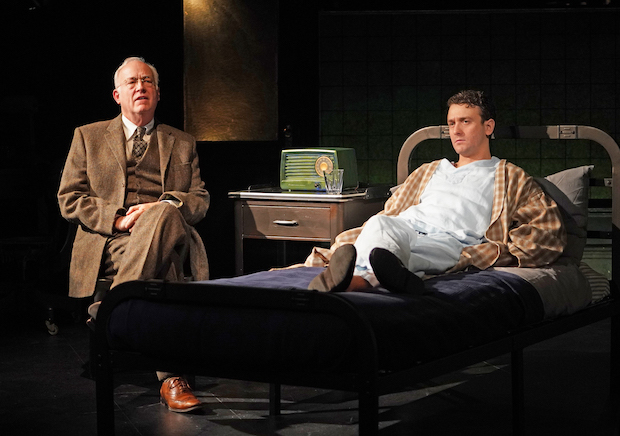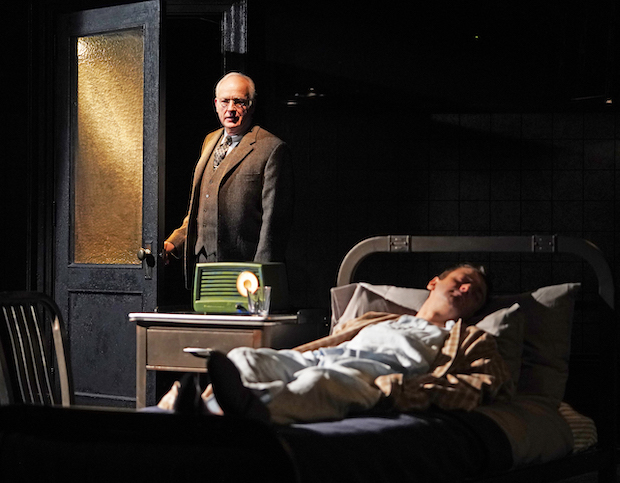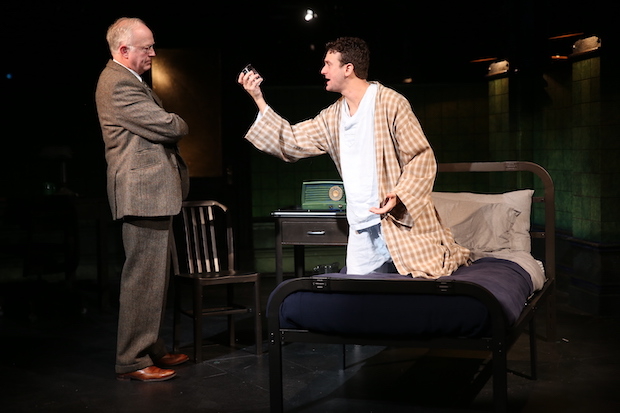Review: Chester Bailey, When the Only Good News Is Fake News
Reed and Ephraim Birney star in the New York debut of Joseph Dougherty’s drama in defense of delusion.

(© Carol Rosegg)
A moral panic grips the country: It's not about sex, drugs, witchcraft, or Communism (all of which are quite acceptable in certain circles). Today's moral panic is about the truth, and the "alternative facts" employed to obfuscate that truth. If only we could rip the scales from their eyes and help them see the light, we fantasize about our ideological adversaries, like Protestant missionaries eager to spread the good word in a heathen land. Joseph Dougherty considers the pitfalls of such evangelism while offering an uncommonly charitable reading of delusion in Chester Bailey, his two-man drama now making its New York debut at Irish Repertory Theatre.
Set in the wake of World War II, it's about Chester (Ephraim Birney), a Brooklyn Navy Yard worker who loses his eyesight and both hands in a violent attack — not by a Nazi saboteur, but a co-worker. Expected to die, he survives and miraculously claims to be regaining his sight. There's just one problem: Neither of his eyes remain. His doctors tell him that seeing again is a medical impossibility, but Chester isn't quite ready to trust the science, not when he can see and describe the Van Gogh print hanging on the wall. Of course, the picture isn't really there — at least not for anyone else to see.
Psychologist Philip Cotton (Reed Birney, father of Ephraim) deduces that Chester must have seen this painting before his accident and his mind's eye is now reproducing it. He tries to demonstrate to Chester the reality of his situation: He asks Chester to describe the doctor's appearance, which he does vividly (and incorrectly). He inquires why Chester allows the orderlies to spoon feed him every meal. "It's part of the service," Chester deflects. He's convinced that his hands are in good working order, and everyone is lying to him.
As he vigorously plies his trade, Dr. Cotton confronts a few of his own delusions while embarking on a secret affair with his boss's wife. His guilt is terrible, but maybe what the boss doesn't know (or doesn't want to know) won't hurt him.

(© Carol Rosegg)
With its dramatization of a violent blinding and subsequent therapy sessions, as well as its preoccupation with belief, Chester Bailey has more than a few shades of Equus. Dougherty doesn't one-up Peter Shaffer's modern classic (nor does he claim to), but he does present a provocative and engrossing story that unfolds with inventive theatricality in Ron Lagomarsino's clever staging.
Chester Bailey also benefits from remarkable performances: Sporting an antique Brooklynese and an adorable smile, Ephraim Birney seems to have emerged from a time machine, exuding a GI-generation optimism that holds the awful truth of the world at bay. Youthful (but not exactly innocent) he sasses the doctor, confident that he is the last sane person on earth. While a tremendous amount of the script is delivered in direct-address monologues (an annoyingly favored device at the Irish Rep), the scenes in which the two actors face-off are as thrilling as any match in the US Open.
One of the great stage actors of our time, the elder Birney delivers his monologues with few frills, conveying a scientific mind that prioritizes fact over feeling — or so Dr. Cotton would like to believe. Yet he betrays a deep sadness in his jarring delivery of seemingly innocuous words like "careless" and "Plymouth." For a brief moment, the dam of medical professionalism bursts and we are awash in the messiest of truths: Humans are not instinctively rational beings.

(© Carol Rosegg)
It's an added treat that this takes place on John Lee Beatty's gorgeous set. With its institutional green tiles and soaring metal arches, it simultaneously embodies the incomplete hull of a ship, a hospital room, and the interior of old Penn Station. A mirror on the upstage wall makes this last effect seem to go on forever. Our minds fill in the details of the cavernous train station, but Beatty makes this a very easy illusion to accept.
Lighting designer Brian MacDevitt further transforms the stage into Luna Park or the Roseland Ballroom, with sound designer Brendan Aanes aurally transporting us there. Toni-Leslie James costumes the two actors as doctor and patient, the former in a tweed three-piece suit and the latter in pajamas topped with a thin robe, which Birney wears like a deposed prince still dreaming of restoration.
It would be unfair to characterize Chester Bailey as an apologetic for the post-truth world. Later developments in the play suggest the damage that can occur when individual delusion becomes adopted by a group (in this case, a hospital staff). But Dougherty also expresses great compassion for those, like Chester, who would rather retreat to the fortress of their mind than face the harsh wilderness of reality. That kind of empathy is increasingly rare in a culture obsessed with the truth.









